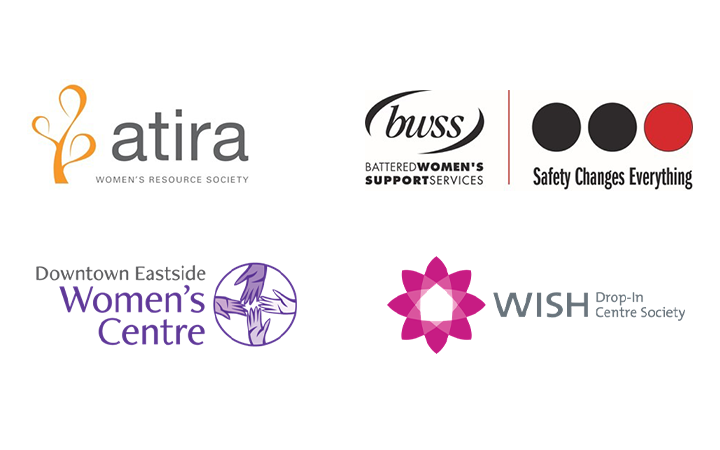
FOR IMMEDIATE RELEASE
August 16, 2022
Women are not acceptable casualties in the response to housing crisis
xʷməθkʷəy̓əm (Musqueam), Sḵwx̱wú7mesh (Squamish) and səlilwətaɬ (Tsleil Waututh) territory / Vancouver, B.C. – Last week, a police operation violently dismantled the encampment along East Hastings in Vancouver’s Downtown Eastside. We firmly condemn those acts of violence, as well as the continued lack of strategy to address the homelessness crisis.
We also condemn the absence of any consideration for women’s safety despite our organizations’ perpetual warnings about the escalation of gender-based violence in “tent cities.” We are calling for a concerted, nuanced action that prioritizes women’s safety.
Tent cities occur because of multiple, overlapping crises: the housing crisis, opioid crisis and deadly drug supply, lack of appropriate mental health care, and deteriorating access to general health services. For many women, especially Indigenous women and women who are racialized, these hardships intersect with centuries of sexist and racist colonial policies. And like everywhere, gender-based violence goes often unchallenged, unreported and unnoticed.
“With every tent city, we see a dramatic increase in gender-based violence. Women are threatened, harassed, beaten, and raped. Their access to our sites is made difficult if not impossible. Our officials need to do more than a mere acknowledgement of the situation”
– Alice Kendall, Executive Director of the Downtown Eastside Women’s Centre.
“We have watched thirty years of planning and policy decisions encompassing addiction, law enforcement, mental health, business improvement, real estate development and housing grind down to the present day. While at the same time, no sustained effort has been made to address the systemic, institutional conditions that give rise to the extreme levels of intimate partner, domestic, and sexualized violence experienced by women in the community. Considering all this violence the last thing we need now is the Vancouver Police Department coming to the neighbourhood to bust heads of impoverished and unhoused people.”
– Angela Marie MacDougall, Executive Director of Battered Women’s Support Services.
“We cannot settle for tent cities that re-emerge and grow each year, instead of immediate and concrete action to house people. Women are among those at greatest risk in encampments. The existence and realities of women in this community continue to be ignored. Consistent failure to meaningfully acknowledge and address the violence women face continues to risk their lives and safety. Given the fact that women make up over 40% of the DTES population, the solutions, priorities, and commitment must at least reflect these proportions. Women’s safety cannot wait. Women deserve to be and feel safe in their communities and in public spaces, and women deserve to be safely and appropriately housed.”
– Mebrat Beyene, Executive Director of WISH Drop-In Centre Society.
“Women must have appropriate, safe, independent and where requested, supportive housing. They must have access to homes where they can see their children, friends and families, and that create opportunities for them to keep themselves and the people they care about safe. Encampments only ensure that we will still be struggling, in another generation, with the same challenges we are struggling with today. We can’t keep doing the same thing over and over again, expecting different outcomes; and we must not sacrifice women’s health, wellness and safety now, to make this point.”
-Janice Abbott, CEO, Atira Women’s Resources Society
Indigenous women are particularly vulnerable to these acts of violence and while we keep seeing new cases of Missing and Murdered Indigenous Women and Youth, the VPD and RCMP’s response to this reality remains inappropriate, or non-existent.
Women-serving organizations are, yet again, calling for a structured, concerted, anti-sexist, trauma-informed response that draws on the many existing recommendations such as those contained in the Calls for Justice and Red Women Rising. We cannot accept the violence perpetrated against women being minimized or overlooked.
In numbers:
- 2,095 residents identified as homeless in 2020 in Metro Vancouver;
- Women represent over 40% of the Downtown Eastside population;
- Indigenous people are overrepresented in the people experiencing homelessness: they make up to 34% of the general homeless population and 45% of the women homeless population;
- In the last month alone, DEWC has responded to 40 women who access the drop-in who had experience sexual assault;
- Over 22,000 homes are empty in Vancouver.
MEDIA CONTACTS:
Downtown Eastside Women’s Centre
Elody Croullebois, Fundraising and Communications Coordinator
778-686-5608
elody.croullebois@dewc.ca
Battered Women’s Support Services
Angela Marie MacDougall, Executive Director
604-808-0507
WISH Drop-In Centre Society
Estefania Duran, Director of Communications
Communications@wishdropincentre.org
604-669-9474 (Ext. 124)
Atira Women’s Resource Society
Janice Abbott, CEO
604-813-0851




